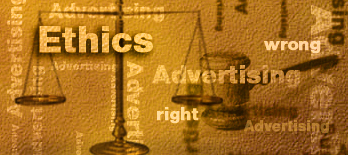
Ethics in advertising policy
Many yearbooks depend upon advertising revenue to sustain financial integrity. It is important they have policy that guides business operations, advertising content decisions and ethical judgments.
For consistency and legal protection, criteria should be in place for selecting or rejecting advertisements in student publications. Legal and ethical issues here can get a bit complicated, and you need to sort them out in a way that balances rights and responsibilities.
If you own the press, you can be as arbitrary as you want regarding selection or rejection of advertising so long as you stay within bounds of protected speech. However, if you advertise unlawful products or mislead consumers, you lose First Amendment protection and the government can regulate, prohibit and intervene with legal consequences.
Student editors don’t own the press, but they often do have choices in advertising. One staff chose not to run a recruiting ad from the National Guard in their yearbook. That’s OK, but what if the Peace Corps wanted to run a recruiting ad? If the staff accommodates the Peace Corps after it rejected the National Guard, is that illegal discrimination?
Probably not if the students have autonomy in making advertising and content decisions. But if public school officials exercise prior review of the yearbook and make arbitrary content decisions themselves, the playing field changes. Government-sanctioned discrimination in editorial advertising is prohibited.
Review Yeo v. Town of Lexington, an appellate court ruling in Massachusetts that specifically addresses some of the legal questions raised when an advertiser demands dissemination of his editorial advertisement in two school-sponsored publications.
In short, Mr. Yeo wanted to run an ad in the student newspaper and yearbook, but both publications rejected the ad. The decisions were made by students.
The ad read:
We know you can do it!
ABSTINENCE:
The Healthy Choice
For accurate information on abstinence, safer sex and condoms,
contact:
Lexington Parents Information Network (LEXNET)
Read the case to get a full appreciation of the legal questions and the Court’s rationale in supporting the students’ decision to deny the ad.
Yeo presents a good argument against the practice of prior review. It offers greater protection to schools that have a free and responsible student yearbook that is recognized as a limited public forum with students in control of the publication’s content. In control, that is, within the parameters set by the courts.
Beyond the issue of the students’ legal right to refuse the National Guard ad, was it ethically right to do so?
Most student editors oppose the practice of arbitrary decision-making by school officials regarding yearbook content. Yet would they favor and practice discriminatory decision-making if they get to make the call on advertising? Would they emphasize their political leanings via the process of selecting or rejecting ads?
Sometimes student journalists may need to remember that they are not the proprietors of their yearbook; they are the caretakers. The yearbook is an institution, sustained by different staffs each year and perpetually nurtured by the school itself.
Ethically speaking, student journalists must look beyond their own prejudices as they guide the yearbook during their tenure of administration. Especially in school, they are expected to act responsibly and to accept accountability.
Yearbook editors serve as custodians of their publication’s continuity. Therefore, ethical considerations should extend beyond individual attitudes and ponder (1) moral principles of the school mission, (2) established ethical codes and practices of professional media, (3) proprieties of the community. These institutional and societal guidelines should help students set self-enforced restraints that help contain individual and whole-staff actions within the arena of what’s good and right.
The power of the student press should be tempered by self-regulated policies that weigh heavily toward the development of noble ethics.
The advertising issues here involve both law and ethics. Students need not only to be concerned about their rights but also about doing what’s right.



